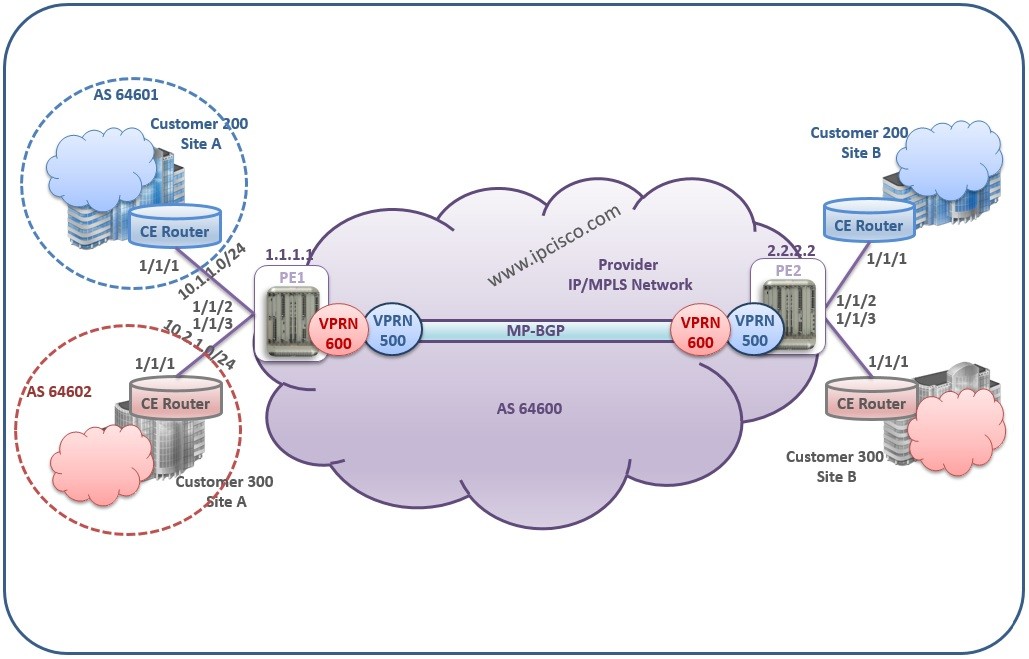- COURSES
- SPECIALS
- BLOG
- MEMBERS
- SHOP
- ABOUT
- ENROLL HERE

Table of Contents
In this Nokia SRA lesson, we will focus on the configuration of VPRN Service (Virtual Private Routed Network) on Nokia (formerly Alcatel-Lucent) Service Routers. Here, We will use Alcatel-Lucent 7450 Service Router as a PE Router. Our Provider Routers will be Nokia (Alcatel-Lucent) 7750 Service Routers. But, there will be no configuration on P routers for this Nokia VPRN Configuration. We assume that we have a proper Provider MPLS Core.
For Nokia VPRN Configuration, we will use the below VPRN topology:

To Test Yourself on Nokia Services, You Can Also Check Nokia Services Quiz Page
To Configure VPRN, firstly routing protocol configuration must be done. Then MP-BGP must be enabled between PEs. Firstly let’s cofigure MP-BGP on 7750 SRs.
PE1# configure router autonomous-system 64600
PE1# exit all
PE1# configure router bgp
PE1>config>router>bgp# group “multi-bgp”
PE1>config>router>bgp>group$ family vpn-ipv4
PE1>config>router>bgp>group$ peer-as 64600
PE1>config>router>bgp>group$ neighbour 2.2.2.2
PE1>config>router>bgp>group>neighbour$ local-address 1.1.1.1
PE1>config>router>bgp>group>neighbour$ exit all
PE1> config>router>bgp# info
group “multi-bgp”
family vpn-ipv4
peer-as 64600
neighbour 2.2.2.2
local-address 1.1.1.1
exit
exit
PE2# configure router autonomous-system 64600
PE2# exit all
PE2# configure router bgp
PE2>config>router>bgp# group “multi-bgp”
PE2>config>router>bgp>group$ family vpn-ipv4
PE2>config>router>bgp>group$ peer-as 64600
PE2>config>router>bgp>group$ neighbour 1.1.1.1
PE2>config>router>bgp>group>neighbour$ local-address 2.2.2.2
PE2>config>router>bgp>group>neighbour$ exit all
PE2> config>router>bgp# info
group “multi-bgp”
family vpn-ipv4
peer-as 64600
neighbour 1.1.1.1
local-address 2.2.2.2
exit
exit
To verify this, you can use, “show router bgp neighbour” command.
As an example for routing protocol configuration, I will give the configuration between Customer Routers and PE1 router.
PE1# configure service vprn 500
PE1>config>service>vprn# autonomous system 64600
PE1>config>service>vprn# bgp
PE1>config>service>vprn>bgp$ neighbour 10.1.1.2
PE1>config>service>vprn>bgp>neighbour$ peer-as 64601
PE1>config>service>vprn>bgp>neighbour$ exit allPE1# configure service vprn 600
PE1>config>service>vprn# autonomous system 64600
PE1>config>service>vprn# bgp
PE1>config>service>vprn>bgp$ neighbour 10.2.1.2
PE1>config>service>vprn>bgp>neighbour$ peer-as 64602
PE1>config>service>vprn>bgp>neighbour$ exit all
CE1>config>router# bgp
CE1>config>router>bgp$ autonomous system 64601
CE1>config>router>bgp$ neighbour 10.1.1.1
CE1>config>router>bgp>neighbour$ peer-as 64600
CE1>config>router>bgp>neighbour$ exit all
CE2>config>router# bgp
CE1>config>router>bgp$ autonomous system 64602
CE2>config>router>bgp$ neighbour 10.2.1.1
CE2>config>router>bgp>neighbour$ peer-as 64600
CE2>config>router>bgp>neighbour$ exit all
In our Virtual Private Routed Network Configuration example MP-BGP will be used between PE routers. Between CE and PE routers BGP will be used. Here, any other routing protocol can be used. But we prefer BGP. So CE and PE are BGP peers.
This is the key configuration part of Nokia Virtual Private Routed Network Configuration. For Nokia VPRN Config, we will follow the below configuration steps:
PE1# configure service customer 200 create
PE1>config>service>cust# description “Our VPRN Customer 1”
PE1>config>service> cust # exit
PE1>config>service# customer 300 create
PE1>config>service> cust # description “Our VPRN Customer 2”
PE1>config>service> cust # exit all
PE1# configure service
PE1>config>service> vprn 500 customer 200 create
PE1>config>service>vprn$ description “VPRN Service of Customer 500”
PE1>config>service>vprn$ router-id 1.1.1.1
PE1>config>service>vprn$ exit
PE1>config>service# vprn 600 customer 300 create
PE1>config>service>vprn$ description “VPRN Service of Customer 600”
PE1>config>service>vprn$ router-id 1.1.1.1
PE1>config>service>vprn$ exit
can i get pdf file of these lessons ?
For now, pdfs are not available Chandresh. But in a short time, my books will be available;)